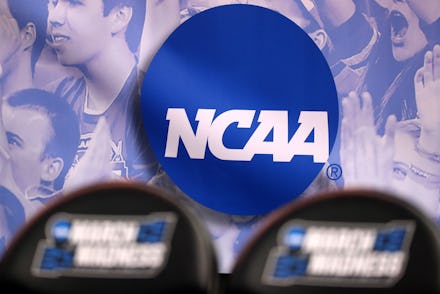NCAA says it will consider North Carolina for championship games after HB2 repeal

North Carolina is back in play.
On Tuesday morning, the National Collegiate Athletic Association announced that it will consider North Carolina to host its 2018-2022 NCAA championship games. The announcement comes less than a week after the state repealed HB2, the infamously unpopular bill that stopped people from using the restroom that matches their gender identity.
In a statement released on their website on Tuesday, the NCAA said the new North Carolina law, HB142, meets the "minimal NCAA requirements" for consideration. The statement said that, while the new law is "far from perfect," it does restore the state to the "legal landscape" that existed prior to HB2.
"We are actively determining site selections, and this new law has minimally achieved a situation where we believe NCAA championships may be conducted in a nondiscriminatory environment," the statement reads. "If we find that our expectations of a discrimination-free environment are not met, we will not hesitate to take necessary action at any time."
Chase Strangio, staff attorney at the American Civil Liberties Union's LGBT and HIV Project, denounced the NCAA's decision on Twitter. Strangio previously called the HB2 repeal bill a "farce" and the "same discrimination repackaged."
"Compromise like this is not meant to make it possible to achieve a better end, it is meant to stop the conversation," Strangio said. "We sold ourselves out."
"Hey NCAA, what about your trans student athletes, coaches and fans? Not worth protecting?" Strangio asked.
The HB2 repeal bill agreed upon by North Carolina congressmen, and signed by the state's Democratic governor, not only repealed HB2, but also put a moratorium on equal protection ordinances throughout the state until 2020 and also put the kabosh on any cities enacting bathroom protections for trans people indefinitely, leaving the matter up to the state.
"The bill makes it illegal to protect people from discrimination," Strangio wrote in a blog post on the ACLU website. "And worse still, it does so under a claimed interest in protecting 'bathroom safety and privacy.'"
According to the statement, those who voted to allow North Carolina to be considered did so "reluctantly" and any sites in North Carolina awarded a championship game will have to submit documents demonstrating that athletes and fans will enter a situation free from discrimination.